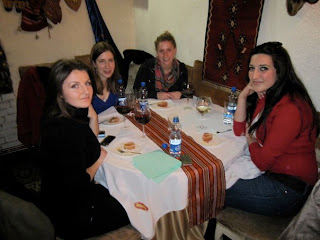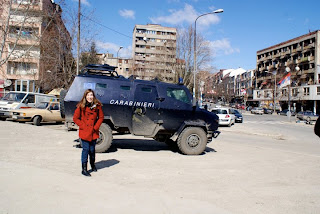Too many of us take life for granted. Really and truly we do. I have grown up in a very loving, very supportive family, where I have never really wanted for anything (though I am sure at some stage I thought I wanted a pony). I never experienced any great tragedy in my life (and hopefully will not), and my chief concerns in life have been schooling related.
In school we read about great tragedies; the holocaust, Rwanda, the Yugoslavian conflict, Darfur, and many other instances which were marked as tragedies on the world scale. Yet these were distant, they almost seemed too extreme to be real, I knew no one who had experienced such things, and my life continued on in its pleasant way despite my emotional condemnation of the actions about which I had read.
Fast forward to my life from March 6-12, 2011. After having spent a couple days in Kosovo I was already seeing the effects of the conflict, from destroyed houses & businesses, to signs advertising for those missing from the conflict, my extra long flight due to the avoidance of Serbia and other indicators of tensions. Monday night I almost started to cry when two girls my age were telling me over dinner about walking for days, not knowing if one would be killed, in order to reach the relative safe haven that Albania was at the time. They told of horrific things they had seen along their way, as well as experiences of their friends (also our age) who saw and suffered unimaginable tragedies. I felt a sense of guilt, guilt that my life was seemingly perfect while others had to suffer through events that no one should ever have to.
By Tuesday I had started to internalize these feelings, turning these stories into further motivation for why I wish to go into world politics and diplomacy. At lunch I got the opportunity to talk to a wonderful Albanian lady named Arta. She talked to me about her experiences during the conflict, what she had been forced to witness, along with the fear that one has for the safety of one’s family and friends. She kept mentioning how lucky we were to be able to get a good education and have the opportunity to experience the world. Lucky to have, by chance, been born in a society in which nothing stands in our way from accomplishing our dreams. Moving on to other topics, our conversation eventually drifted to the traditional arts of weaving in Albanian culture. I told her that I would love to be able to see, and purchase some of these traditional weavings. My friend Beth was also interested in the possibility of taking home as a souvenir a traditionally woven article, such as those we had seen in the national museum.
When we finished lunch our new friend Arta grabbed Beth and I, hurrying us down the street to a place where we could acquire some of these pieces of art. Suddenly we stopped outside a little , slightly dilapidated place. She had explained on the walk that it was a local NGO for women maimed in the war, where they wove things in traditional Albanian fashion in order to raise money for things such as basic care, housing and things of that nature. Walking into the place on International Women’s day was quite special, for they were having a tea party with all the women of this organization. They were so excited to have us visit them, taking a fair amount of time out of their party to talk to us and show us their works of art. Speaking through Arta, who acted as our translator they told us of lost limbs, mutilations, and other forms of maiming which occurred during the war. Through Arta, we expressed our thanks for telling us their stories, and we selected a few items each to purchase. Before we left they told us that it means so much for other people, like Americans, to show interest in these women’s stories and what they are doing.
This visit really affected me, and I have been thinking about it ever since. Though I still feel a sort of guilt, I feel more of what Arta referred to as Luck. That I was lucky in life to be spared of such experiences and as such I have a responsibility to attempt to improve conditions for others in this world. We live in a small world. That is undeniable. Many of us are blessed to have been born into fortunate circumstances, but with that comes a responsibility not to be ignorant of others’ circumstances, and to strive to improve the situation of our fellow beings around the world. While we debate about what to wear for a night out, or worry about if we will get into the best graduation programs, we forget. But we should strive to never forget no matter what we do in life, for to forget entirely would be to lose purpose. These brave ladies of Kosovo taught me that, and for that life lesson I shall always be Thankful!





















